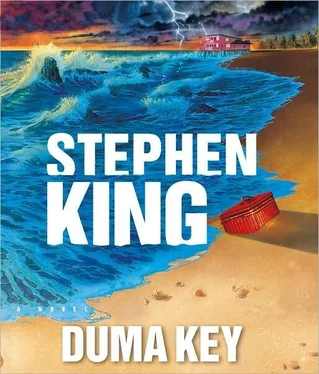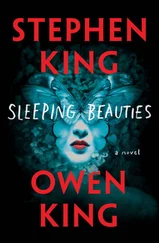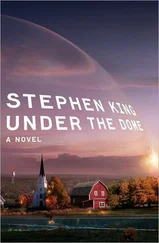Oh, some of that old ability may still remain — like scar-tissue on the dura of the brain from an old injury (caused by falling out of a pony-trap, let’s say) — and you might have to find ways to let that out once in awhile, to express it like a build-up of pus from an infection that will never quite heal. So you get interested in other people’s art. You become, in fact, a patron of the arts. And if that’s still not enough? Why, maybe you begin to collect china figures and buildings. You begin to build yourself a China Town. No one will call creating such tableaux art, but it’s certainly imaginative, and the regular exercise of the imagination — its visual aspect in particular — is enough to make it stop.
Make what stop?
The itch, of course.
That damnable itch.
I scratched at my right arm, passed through it, and for the ten thousandth time found only my ribs. I flipped back the cover of my pad to the first sheet.
Start with a blank surface.
It called to me, as I was sure such blank sheets had once called to her.
Fill me up. Because white is the absence of memory, the color of can’t remember. Make. Show. Draw. And when you do, the itch will go away. For awhile the confusion will subside .
Please stay on the Key, she had said. No matter what happens. We need you.
I thought that might be true.
I sketched quickly. Just a few strokes. Something that could have been a cart. Or possibly a pony-trap, standing still and waiting for the pony.
“They lived here happily enough,” I told the empty studio. “Father and daughters. Then Elizabeth fell out of the pony-trap and started to draw, the off-season hurricane exposed the debris field, the little girls drowned. Then the rest of them pop off to Miami, and the trouble stops. And, when they came back nearly twenty-five years later…”
Beneath the pony-trap I printed FINE. Paused. Added AGAIN. FINE AGAIN.
Fine, the shells whispered far below. Fine again.
Yes, they had been fine, John and Elizabeth had been fine. And after John died, Elizabeth had continued being fine. Fine with her art shows. Fine with her chinas. Then things had for some reason begun to change again. I didn’t know if the deaths of Wireman’s wife and daughter had been a part of that change, but I thought they might have been. And about his arrival and mine on Duma Key I thought there was no question. I had no rational reason for believing that, but I did.
Things on Duma Key had been okay… then strange… then for a long time they’d been okay again. And now…
She’s awake.
The table is leaking.
If I wanted to know what was happening now, I had to know what had happened then. Dangerous or not, I had to.
I picked up her first drawing, which wasn’t a drawing at all but just an uncertain line running across the middle of the paper. I took it in my left hand, closed my eyes, and then pretended I was touching it with my right, just as I had with Pam’s HANDS OFF gardening gloves. I tried to see my right fingers running over that hesitant line. I could — sort of — but I felt a kind of despair. Did I mean to do this with all of the pictures? There had to be twelve dozen, and that was a conservative estimate. Also, I wasn’t exactly being overwhelmed with psychic information.
Take it easy. Rome wasn’t built in an hour.
I decided a little Radio Free Bone couldn’t hurt and might help. I got up, holding the ancient piece of paper in my right hand, and of course it went fluttering to the floor because there was no right hand. I bent to pick it up, thinking I had the saying wrong, the saying was Rome wasn’t built in a day.
But Melda says nour.
I stopped, holding the sheet of paper in my left hand. The hand the crane hadn’t been able to get to. Was that an actual memory, something that had come drifting out of the picture, or just something I’d made up? Just my mind, trying to be obliging?
“It’s not a picture,” I said, looking at the hesitant line.
No, but it tried to be a picture.
My ass went back onto the seat of my chair with a thump. It wasn’t a voluntary act of sitting; it was more a case of my knees losing their lock and letting go. I looked at the line, then out the window. From the Gulf to the line. From the line to the Gulf.
She had tried to draw the horizon. It had been her first thing.
Yes.
I picked up my pad and seized one of her pencils. It didn’t matter which one as long as it was hers. It felt too big, too fat, in my hand. It also felt just right. I began to draw.
On Duma Key, it was what I did best.
I sketched a child sitting on a potty chair. Her head was bandaged. She had a drinking glass in one hand. Her other arm was slung around her father’s neck. He was wearing a strap-style undershirt and had shaving cream on his cheeks. Standing in the background, just a shadow, was the housekeeper. No bracelets in this sketch, because she didn’t always wear them, but the kerchief was wrapped around her head, the knot in front. Nan Melda, the closest thing to a mother Libbit ever knew.
Libbit?
Yes, that was what they called her. What she called herself. Libbit, little Libbit.
“The littlest one of all,” I murmured, and flicked back the first page of the sketch-pad. The pencil — too short, too fat, unused for over three-quarters of a century — was the perfect tool, the perfect channel . It began to move again.
I sketched the little girl in a room. Books appeared on the wall behind her and it was a study. Daddy’s study. The bandage was wound around her head. She was at a desk. She was wearing what looked like a housecoat. She had a
( ben-cil )
pencil in her hand. One of the colored pencils? Probably not — not then, not yet — but it didn’t matter. She had found her thing, her focus, her métier . And how hungry it made her! How ravenous!
She thinks I will have more paper, please.
She thinks I am ELIZABETH.
“She literally drew herself back into the world,” I said, and my body broke out in gooseflesh from head to toe — for hadn’t I done the same? Hadn’t I done exactly the same, here on Duma Key?
I had more work to do. I thought it was going to be a long and exhausting evening, but I felt I was on the verge of great discoveries, and what I felt wasn’t fright — not then — but a kind of copper-mouthed excitement.
I bent down and picked up Elizabeth’s third drawing. The fourth. The fifth. The sixth. Moving with greater and greater speed. Sometimes I stopped to draw, but mostly I didn’t have to. The pictures were forming in my head, now, and the reason I didn’t have to put them down on paper seemed clear to me: Elizabeth had already done that work, long ago, when she had been recovering from the accident that nearly killed her.
In the happy days before Noveen began to talk.
At one point during my interview with Mary Ire, she said discovering in my middle age that I could paint with the best of them must have been like having someone give me the keys to a souped-up muscle car — a Roadrunner or a GTO. I said yes, it was like that. At another point she said it must have been like having someone give me the keys to a fully furnished house. A mansion, really. I said yes, like that, too. And if she had gone on? Said it must have been like inheriting a million shares of Microsoft stock, or being elected ruler for life of some oil-rich (and peaceful) emirate in the mideast? I would have said yeah, sure, you bet. To soothe her. Because those questions were about her. I could see the longing look in her eyes when she asked them. They were the eyes of a kid who knows the closest she’s ever going to get to realizing her dream of the high trapeze is sitting on the bleachers at the Saturday matinee performance. She was a critic, and lots of critics who aren’t called to do what they write about grow jealous and mean and small in their disappointment. Mary wasn’t like that. Mary still loved it all. She drank whiskey from a water-glass and wanted to know what it was like when Tinker Bell flew out of nowhere and tapped you on the shoulder and you discovered that, even though you were on the wrinkle-neck side of fifty, you had suddenly gained the ability to fly past the face of the moon. So even though it wasn’t like having a fast car or being handed the keys to a fully furnished house, I told her it was. Because you can’t tell anyone what it’s like. You can only talk around it until everyone’s exhausted and it’s time to go to sleep.
Читать дальше










